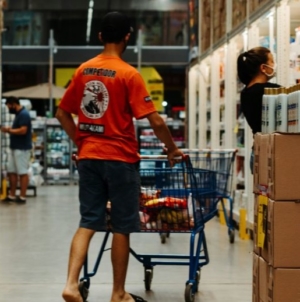-
GOPLASTICPALLETS.COM AND GOMI TEAM UP TO CREATEINNOVATIVE TECH FROM END-OF-LIFE PALLETS - 5 hours ago
-
Nulogy Introduces the Manufacturing Operating System - February 27, 2026
-
Bliss Direct scales to 300 daily orders and saves 25 hours per week with Forterro’s Orderwise ERP - February 25, 2026
-
Wootzwork raises $6.6M to bring predictability to offshore manufacturing - February 25, 2026
-
Rite-Hite unveils new range of hydraulic kits to upgrade and extend dock leveller performance - February 19, 2026
-
REWE and Cimcorp automate fresh supply chain for Berlin supermarkets and stores - February 19, 2026
-
Q1 – A recovery period or time to fix, switch and scale? - February 19, 2026
-
NULOGY’S SHOP FLOOR SOFTWARE TO POWER COMPLETE CO-PACKING’SOPERATIONS - February 13, 2026
-
Why lead generation depends upon good content - February 13, 2026
-
Wallapop and Albatross Sign Strategic Partnership to Bring Real-Time AI Discovery to the Future of Consumer-to-Consumer Commerce - February 12, 2026
A COLLABORATIVE APPROACH TO WAREHOUSE SECURITY
By Brendan Musgrove, Managing Director at Cordant Security
Introduction
Warehouses and distribution centres are often the target for both opportunistic and prearranged crime and whilst a vigorous, yet fairly static approach to security may deter the everyday opportunist, it will not deter a seasoned and prepared criminal. Catching them is like a game of ‘cat and mouse’ with the problem at hand ever changing.
The shrinkage rate in warehouses and depots caused by staff thefts can put a big dent in company profits, especially in the current economic climate where margins are tight. Unfortunately, this problem shows no sign of abating, as in recent years the tactics being deployed by potential thieves have become more sophisticated.
Current challenges
The challenge for companies is that inevitably all their staff tend to become very familiar with the buildings they are working in and the security measures that are in place. They have first-hand knowledge of how the manned patrols operate, where the technology such as CCTV is located, and where the valuable stock is held. All this makes it relatively easy for a potential thief. Also, many seasonal staff tend to work across several warehouses in a region and are able to identify the least secure. Those with criminal intentions will exchange information and tactics and sometimes work in collaboration to successfully smuggle goods out of the warehouse.
The drivers know that there aren’t the resources to search every vehicle and just simply wait until another vehicle has been stopped before adding ‘stolen’ items or failing to scan certain parcels. They know that you have no jurisdiction to stop them on their routes and that once they are out of the depot they have got away with it.
Although vetting procedures such as checking employment history are employed when recruiting staff to try and avoid taking on risky individuals, such measures will not prevent all theft. While designs of warehouses have evolved to feature increased technology and multi-level access control including turnstiles, cages and locked-off areas for high value items, such precautions can only go so far.
How to tackle the problem
More retailers, manufacturers, logistics firms, and fulfilment houses are now taking a pro-active approach to warehouse security in a bid to deter, identify and catch criminals. As a result, you are now seeing more of these companies enlist the help of an external specialist.
Outsourcing any type of process or service can be a difficult decision for any business. However, when it comes to security, the opportunity to tap into a third-party provider’s extensive experience, expertise, and dedicated processes and people, can make a real difference. By outsourcing their security function, warehouse operators are afforded more time and resources to focus on their core capability, safe in the knowledge that their supplier can deliver the best possible results.
This is certainly the case for a number of our clients, including industry-leading retailer Shop Direct, who we have worked with since 2001. When I asked Dean Cooper, Head of Group Security at Shop Direct about the benefits of outsourcing, he said: “Having previously maintained manned guarding in house we have found outsourcing gives us better cost certainty and resilience of supply. Also, in choosing the right supplier you can leverage the experience of security professionals who will proactively bring a range of ideas and best practise to the table. Our long-term relationship with Cordant has demonstrated real tangible benefits for Shop Direct on a number of levels.”
For our retail clients, we have also witnessed that there is a benefit to having a consistent security framework in place right across the supply chain. By operating a joined-up approach across manufacturing centres, logistics hubs and retail stores, it is easier to reduce any weak links, which has been evident by our partnership with Iceland.
Duncan Miles, the company’s Head of Security, told me: “Cordant has provided security services to Iceland for over 13 years now. Starting originally in only a few retail stores, they now provide security across the whole of our supply chain including manufacturing and logistics. We believe having one provider covering the whole supply chain has benefits in terms of an holistic approach to security and more integrated partnership approach.”
We prioritise this level of collaboration with each of our clients in order to tailor security solutions that will have the maximum impact. I ensure we have regular reviews where the type of loss issue at hand is discussed and proposals for addressing agreed. This enables both parties to change the emphasis of the service to respond quickly to any changing patterns or threats.
We also ensure we have the flexibility to put these plans into play, often at short notice, which may mean moving officers around the site, or drafting in additional resource. This is why we continue to invest in developing our own pool of well-trained officers that we can draw upon when required, whilst our “elite” resource can be called upon when needed to undertake specialist covert activities or enhanced searches.
Conclusion
Warehouse security is a complex task with the manufacturing, retail and logistics sectors constantly facing opportunistic and organised theft. I believe the best way to tackle this problem is for warehouse operators to work in close collaboration with security specialists that have the expertise, technology, innovative solutions and significant resources to deliver real results. By outsourcing this functionality, these companies can benefit from a modern, agile and flexible security solution without a significant outlay.























